Neo Yokio’s Camp Is Hard to Enjoy Through the Transphobia
Also the classism. And the lowkey misogyny. And...
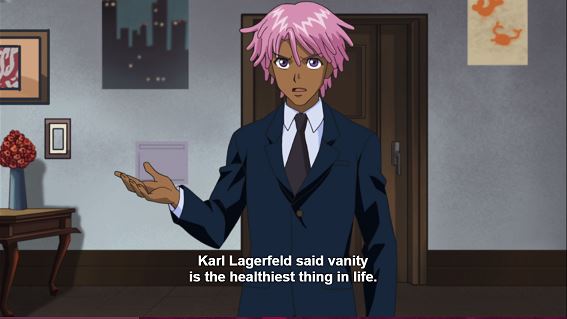
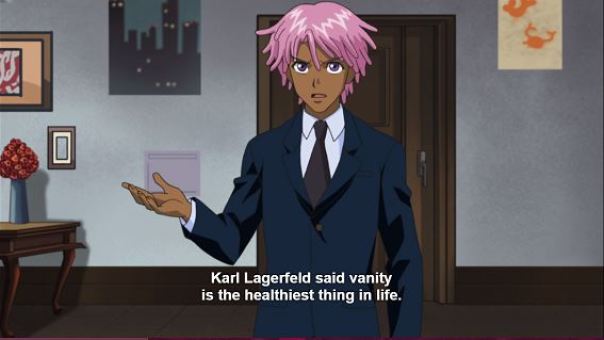
Neo Yokio—an anime-style Netflix miniseries written by the lead singer of Vampire Weekend, steered by the executive producer who was also behind Metalocalypse and Superjail!, and starring Jaden Smith—was released this Thursday to great…well, there were a lot of tweets about it, anyway. The series revolves around Kaz Kaan, an exorcist and member of the “neo riche,” as he battles very relatable concerns like purchasing a tuxedo that’s slightly the wrong shade and having to clear out a dead relative’s house in the Hamptons. Some have defended the series as satire, some have embraced it as camp, and some have settled in to watch the garbage fire secondhand.
This was not a series to be watched alone, so I enlisted fandom academic and acerbic wit (and, full disclosure, my partner) Dorothy Kingswood to help me truck through all six episodes. The experience left us four hours closer to death; hopefully our discussion will shed some light on the baffling fumble of execution that is Neo Yokio.
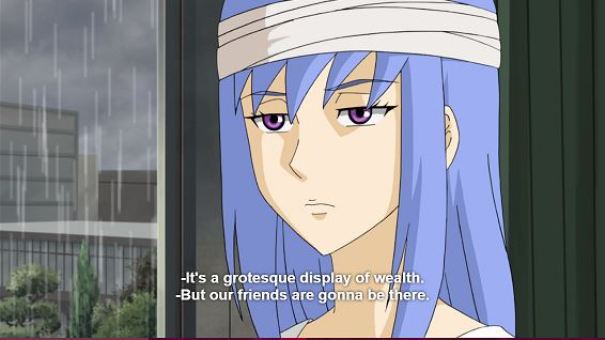
Vrai Kaiser: Most people are, I think, flocking to watch this on the assumption that it’ll be good MST3K material–the trailer definitely gave off that kind of vibe. The horrible truth, though, is that Neo Yokio quickly stops being fun-stupid and moves right into being exhaustingly stupid.
Dorothy Kingswood: Yeah, I mean, when I turned on Netflix, I was certainly expecting a tamely silly piece of adolescent weeb power fantasy–and that’s said with love. There is nothing inherently wrong with wanting that kind of cheesy, popcorny entertainment. The problems, though, are many and rampant, starting from the Hanna-Barbera-as-Flash cheapo art and continuing on through concept and execution right up to its insistence on attempting to apply the language and theories of progressive thought in a careless and slapdash manner. It wants to make audiences really think, man, but instead wallows in a sea of superficiality, shallowness, and aesthetics that the creators can’t quite bring themselves to let go of, despite their moves towards interrogation.
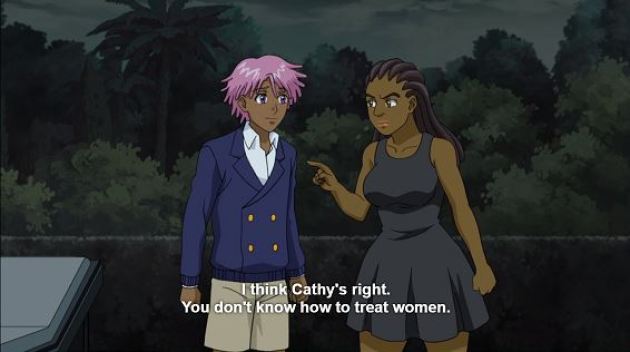
VK: It’s ostensibly meant to be satire–that’s certainly in the headlines of plenty of reviews I’ve seen, and Ezra Koenig floated it as parody before he allegedly started “caring about the characters,” but it fails pretty crucially from the word “go.” If Jaden Smith’s character is supposed to be representative of the idle, idiotic rich, we should probably be exposed at some point to characters who aren’t the .01% or aiding and abetting same. I believe you called him “Bertie Wooster without the charm.”
DK: He is, he really is. They give him a mean bossy Aunt Agatha who makes him–horrors!–actually perform exorcisms. She’s a clear reference to Wodehouse’s works, but where the goodhearted Bertie essentially wanted to be left alone and allowed to enjoy himself, Kaz is intensely focused upon his externally-validated social standing. Which brings us, I guess, to one of the oddest conventions of Neo Yokio (the location): the Times Square Bachelor Board.
VK: Ah, yes–imagine if those “most eligible bachelor” lists leapt from the pages of magazines to be inexplicably emblazoned on the heart of Times Square. It exists entirely to set up a rivalry with the local blond asshole, but there’s never any real sense of urgency beyond the fact that Draco (not his real name) said a mean thing about Kaz once. The plotting for the series is lax beyond belief, as if Koenig grasped that long-running anime have early establishing shenanigans-based episodes but not that one shouldn’t apply that logic to a show with a six-episode maximum.
All of that is within the realm of camp, though–stupid plotting is a help to mockery if anything, and I’m sure some people will be drawn in by the low-quality animation and that Big Toblerone meme. Plus, it is nice to see animated series with racially diverse casts. It’s just such a shame about, y’know, the rest of it.
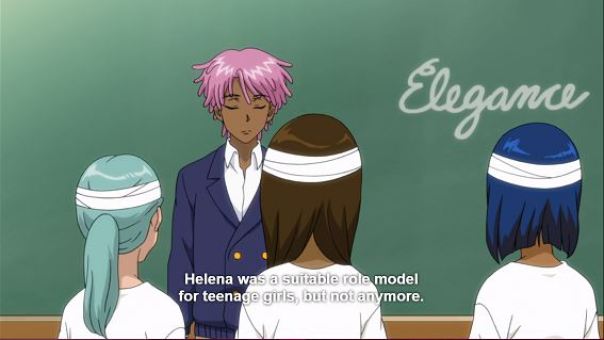
DK: The Mean Thing that not-Draco said about Kaz is implied to be a slur, in that the lax, sloppy worldbuilding includes a Hogwarts-lite sort of wave at Once Upon A Time Sorcerors Were an Oppressed Class, You Know, and “ratcatcher” is their “Mudblood.” Also all the magic people have pink, purple, or blue hair, but so does poor, poor Helena St. Tessoro, because something this obviously inspired by 90s anime cannot possibly abide a love interest with boring regular hair, worldbuilding be damned.
VK: Neither of us are really qualified to get too deep into the series’ approach to race, but the show does definitely choose to have an oppressed fantasy underclass rather than dealing with issues even tangentially related to real-world racism. Which might be an attempt to create an aspirational fantasy, but that’s not the vibe I get from the show. It seems to think it’s saying something. So…rather than say anything real, it makes up its own windmills to swing at. It lives in an absolutely wretched bubble, and its homages to anime sometimes cross into straight-up appropriating terms from Japanese culture it doesn’t get. Specifically hikikomori, a thing anime makes jokes about but is…y’know, an actual community of real people suffering from mental illness.
Certainly we CAN say that its approach to women isn’t great. There’s Helena, as you mentioned, who spends most of the series as a strawman and Freshman Who Just Read the Communist Manifesto.
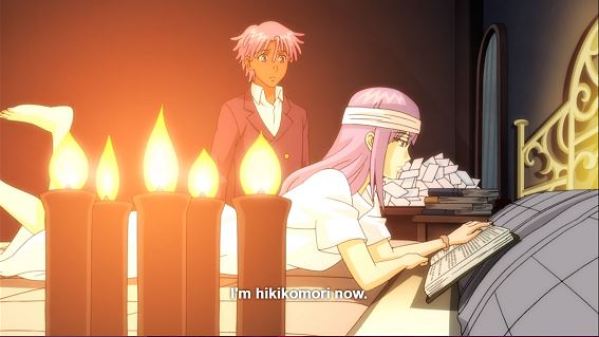
DK: The ill-use of hikikomori goes hand-in-hand with the show’s decision to describe Kaz’s whining over girls breaking up with him as “depression.” Sure, he’s theoretically meant to be a flawed protagonist in a shallow fishbowl world, but that doesn’t really hold water when there are no stakes or consequences, and every realization of his asshattery results in no marked change in his behavior.
The show gives lip service to performative wokeness, but always in aid of getting away with doing the very things it calls out. It’s a sort of Hipster Racism as applied to every other type of oppression the writers have at some point read about. (Homophobia, misogyny, transphobia, classism.)
In anything else, Helena would be insufferable. In this, she is the best character in a bad bunch, simply because she actually modifies her actions and lifestyle in line with her changing beliefs. And that says a lot. (Also, given her later actions, that’s far from a ringing endorsement.)
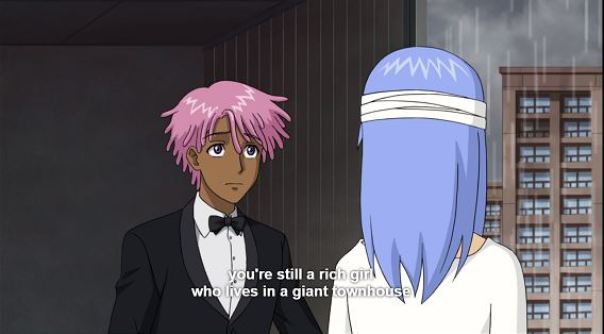
I hope you weren’t expecting that subtitle to be examined at any future point
VK: A lot of it is easy to shrug off in isolation, I think, particularly the early going: the fact that the show is too dumb to understand the “anime” terms it appropriates, the fact that the protagonist is a bubble-headed rich idiot whose biggest problem in life is his very expensive suit being the wrong color, the fact that most of the female characters are totally unimportant–either they’re idiots, they’re evil, or they’re…whatever the writing was trying to do with Helena. But camp is found, not created, and it’s a lot harder to sink blissfully into the silliness when the show keeps tapping you on the shoulder to Say Something. And then it says things that are completely tone-deaf.
The anime references, for example; mostly they’re eye-rolling and pretty basic. “Hey, it’s the dream sequence from AKIRA!” “Hey, they said tuxedo mask!” But then they decide to parody Ranma ½ (one of Koenig’s favorite anime, apparently), and things go real sideways, real fast.
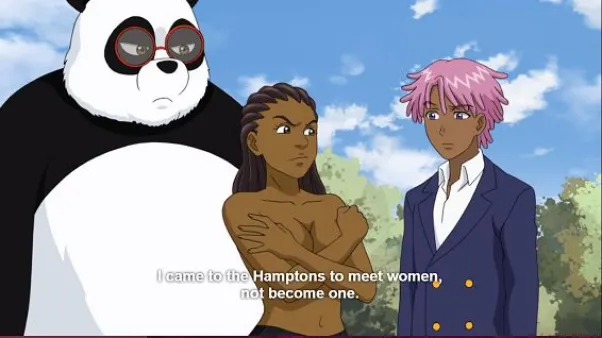
Now Ranma (a series about a boy who’s cursed to turn into a girl whenever he’s splashed with cold water) is a series that provided a kind of wish-fulfillment role among a certain age group of trans nerds, myself included. But it was hugely problematic in regards to gender essentialism when it was written in the 90s, and it’s only gotten more ugly with age. There is absolutely no way a cis creator could tango with that material in a tasteful way. And this is egregiously bad.
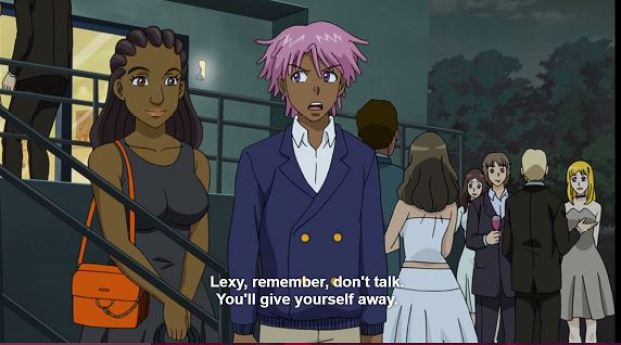
By introducing a shenanigansy plot wherein Kaz’s cis male friend is transformed into a woman, the show opens the door to twenty minutes of walking into horrible stereotypes about trans women, including having the female-identified, loudly male-identifying Lexy use his physical appearance to hit on a lesbian; or having Kaz tell Lexy not to talk because his voice “gives him away.” The latter plays on fears of trans women being subject to mockery or even violence if they can’t pass, and the former plays right into TERF ideology that trans women are “really” just men trying to get with lesbians.
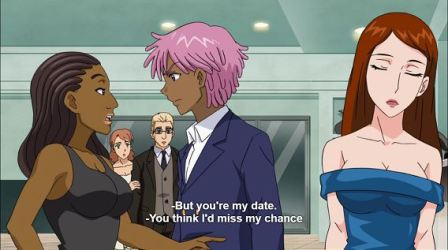
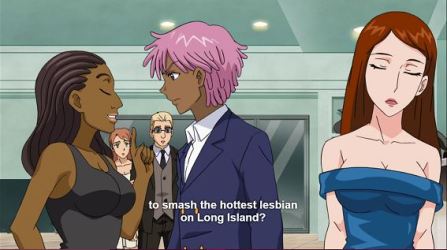
DK: Don’t forget that it uses that male character, Lexy, as the speaker for nearly all of its “feminist” talking points–neatly keeping the voice located within the mouth of a Dude. In a better show, this would mean something, like that Kaz only listens to other men, but in this? He dismisses Lexy just as much as Helena, to no apparent ill effects for their friendship once the magic spell is reversed. (Ah, the good old reset button. Because the writers enjoy both gag-an-episode structures and ongoing arcs, and haven’t figured out where those things might be incompatible.)
VK: And then the episode has the gall to pretend it’s about Kaz being sexist to women and patronizingly tells the viewer that gender is a spectrum, not a binary. Fuck you, Neo Yokio.
….Actually that’s something of a distillation of the show’s problem. It knows how to parrot concepts but absolutely fails to grasp the contexts at play behind them. I mean, that classism.
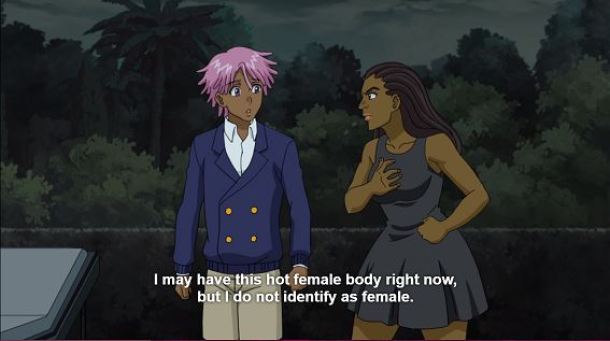
DK: The classism is baked into the premise; only two people of a lower status are given speaking roles. One is a fawning Bergdorf’s employee whom Kaz calls “Salesclerk” to his face.
The other is a human being Kaz literally owns.
Getting into spoilers, here, but over the course of that same hi-lar-ious transphobia episode, Kaz spends an entire subplot denying a personal servant access to resources that they need in order to function, as they repeatedly plead for him to assist in sustaining their life, because they are unable to disobey his minor whims even for such a dire predicament. This is played for laughs.
VK: For a show that’s ostensibly about the corruption of society and the exploitation of the average person by the elite in the end (I think? It’s possible Eden of the East is one of the shows Neo Yokio would like us to know it has seen), it has absolutely no interest in showing us any kind of actual civil unrest. All the employees of the rich are pleased as punch with their roles (even the human being Kaz definitely owns, whom we have no indication has been paid ever); Helena is the only mouthpiece for anti-capitalist ideology, and she experiences it in an entirely theoretical way.
The show name-drops designer fashion brands endlessly, valorizes the nobility of shallowness, practically drowns the viewer in luxury- and food-porn it can’t actually afford to animate beguilingly, and then pretends like it’s commenting on the excesses of rampant capitalism via a character who is also a billionaire who has never known hardship. This is Reality Bites, 2017 edition.
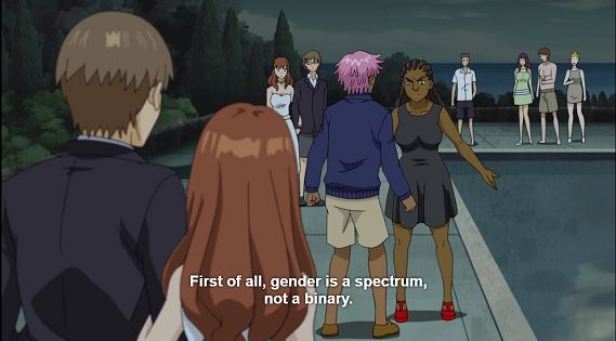
DK: None of which sits well with the conceit of a demon-hunting show. Because, lest we forget, our hero is ostensibly a magical demon hunter who fights… definitely not season 1 Sailor Moon villains. At all.
That whole plotline sort of fades away after the exorcism of Literal Monster Taylor Swift, presumably at the behest of Spotify.
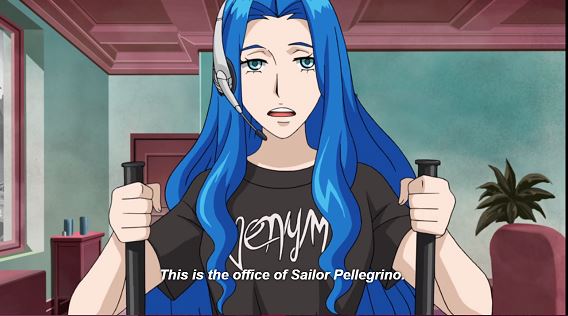
SAILOR PELLEGRINO CAN’T COME TO THE PHONE RIGHT NOW
Sharp satire there, folks.
The demons here seem to be in some way connected to greed or avarice, except that after the halfway point the focus shifts to the ills of Neo Yokio’s castle-in-the-clouds elite. The metaphor collapses in on itself.
And perhaps most uncomfortably of all, the creators choose to represent the destabilization of the social stratification through the elimination of its biggest, dumbest symbol: the Bachelor Board.
By bombing.
This is shown as a positive action.
While Smith was only 3 years old the last time Americans saw NYC landmarks burning and falling, Koenig doesn’t have the excuse of youthful thoughtlessness. Why did he, and everyone else on the production team, believe that mimicking 9/11 of all things was a good idea?
VK: I have no idea what this show thought, at any point. I’m unsure we can prove it did. It’s so breathtakingly stupid in ways that can’t possibly have been on purpose (SEE! Kaz lecturing young women about how Helena is no longer an acceptable role model for them. CRINGE! As Helena evolves into some kind of cis-swapped version of Christian Slater in Heathers. BAFFLE! As Kaz buys ANOTHER ROBOT that may house a human who will never be paid, we just don’t know).
There are probably people who can get down with that, toxically transphobic episode aside. But a show that’s supposedly parodying the wealthy by giving their entire lifestyle a lavish tongue bath really doesn’t work for me at a point where I’m worried about losing medical care and feeding my family. You?
DK: This was four hours of my life I spent, shouting and livetweeting in bursts between being periodically struck dumb by the sheer offensive incompetence of it all. It’s not The Room or Birdemic bad; it’s not even the toxically hopeful foolishness of Plan 9 From Outer Space.
Instead, Neo Yokio is the kind of bad you get sitting in a Gender Studies lecture hall, listening to a dude with a trust fund and a scarf explain Marxism to the professor.
But, you know, they’ve got pastel hair.
Dorothy Kingswood is a queer nerd with a Master’s degree in talking about fans. She’s a bartender by day and a writer by night, or maybe the other way around. Previously, she’s taught English, interned as a copy editor, and dug ditches in summer. You can hear more of her dulcet tones on her podcast, Trash & Treasures, or tweet her @dorothynotgale.
Vrai Kaiser is a queer author and pop culture blogger; they can’t. You can read more essays and find out about their fiction at Fashionable Tinfoil Accessories, listen to them podcasting on Soundcloud, support their work via Patreon or PayPal, or remind them of the existence of Tweets.
Have a tip we should know? [email protected]